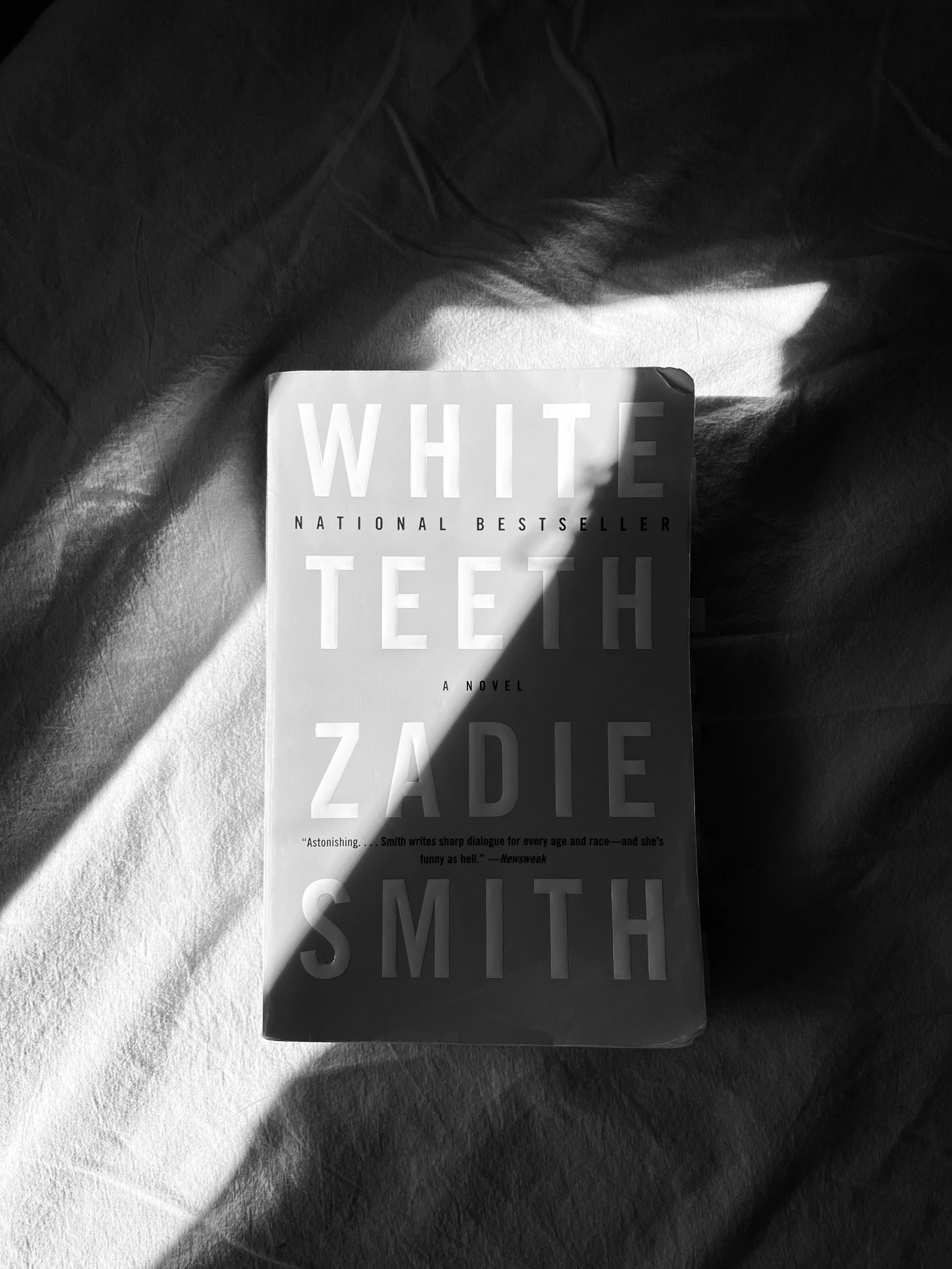16: Book Review 5, White Teeth by Zadie Smith
Rating: 3 out of 5 stars
This novel’s strength lay in its characters: they are realistically messy, lost, and grasping for identity in a contemporary London prone to whitewashing, saviorism, and religious and political conformity under the jaded guise of progress.
The plot itself is spun like a web, though somewhat disparate and meandering. The nonlinear journey acts as a vessel to create commentary on the intertwining of lives--lives Smith layers into a familiar human mess with a central focus on identity. It is both a coming-of-age thinkpiece and a sober contemplation of aging out of change. With an artful writing style, the narrative voice is fairly consistent, but at times I found myself losing interest or momentum while reading. On occasion it felt as though the dialogue could trip up the beauty of the prose, a wonderful description of a scene would be abruptly cut short and replaced with smaller, less masterly illustrations between quotes.
Overall this is a unique and culturally self-aware piece of social explication, both charmingly witty and bluntly opinionated.
The idea of fate, of a personal “story” as it were, is central to White Teeth. We follow three culturally disparate families: English, Bengali, and Jamaican. The immigrant parents live in fear of both their own and their children's acclimation to a society they struggle to contend with; cultural difference begets moral cleavages, religious apathy, or righteous neighborly rage. Families drift apart, find new homes and ways of being in a foreign land.
“Cold, wet, miserable; terrible food, dreadful newspapers—who would want to stay? In a place where you are never welcomed, only tolerated. Just tolerated. Like you are an animal finally housebroken. Who would want to stay? But you have made a devil's pact.. it drags you in and suddenly you are unsuitable to return, your children are unrecognizable, you belong nowhere."(336)
Smith toys with conditional love, with loneliness and infidelity, the unrequited lover left out in the cold and the overzealous affection displayed to all in performatively happy marriages. Ideas of human confusion, of trying to contend with our flaws in the face of hard situations, sentimentality pervades the picture.
“She wanted to find whoever had damaged him like this, damaged him so terribly; she wanted to find whoever had made him unable to love her. It's a funny thing about the modern world. You hear girls in the toilets of clubs saying, ‘Yeah, he fucked off and left me. He didn't love me. He just couldn't deal with love. He was too fucked up to know how to love me.’ Now, how did that happen? What was it about this unlovable century that convinced us we were, despite everything, eminently lovable as a people, as a species? What made us think that anyone who fails to love us is damaged, lacking, malfunctioning in some way?” (381)
This book posed the continuous question of whether or not humanity can be made better, improved upon indefinitely into a virtual or hypothetical transcendence: a sinner made saint, a rebel made leader, an outsider adopted, a bumbling idiot made resolute. The whole premise of the genetically modified mouse, DNA-coded to exhibit certain diseases and phenotypic changes over the course of a predetermined seven year life span, represents Smith’s enduring question of fatalism, of humans playing god.
“But it really doesn't matter what we believe. It seems it won't stop the man who thinks this life is guided by the life he thinks he had before, or the gypsy who swears by the queens in her tarot pack. And it's hard to change the mind of the high-strung woman who lays responsibility for all her actions at the feet of her mother, or the lonely guy who sits in a folding chair on a hill in the dead of night waiting for the little green men. Amid the strange landscapes that have replaced our belief in the efficacy of the stars, Millat's is not such odd terrain. He believes the decisions that are made, come back. He believes we live in circles. His is a simple, neat fatalism. What goes around comes around.” (419)
The belief that all events are predetermined and therefore inevitable poses a choice to the reader, a slow and steady coaxing into a world of commiserate confusion, crossties, contradiction, and existential theories. Smith lays out endless examples of human complexity in the face of fatalism, nihilism, absurdism, and asks, what do you believe?
I post all book reviews in shorter form on my Goodreads @ groovygab ! Thanks for reading.



